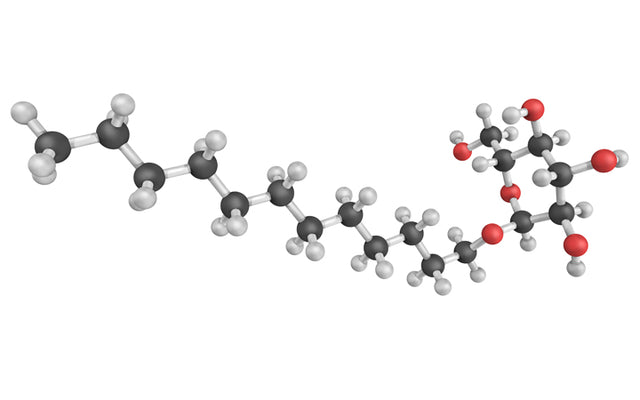How many of you pay attention to the ingredients that go into your cosmetics? Indeed, many of you don't, or even if you do read through them, you may overlook the names of the ingredients that you don't recognize.
Whether a food label or a beauty product, don't skip looking at the ingredient list, even if it's just a quick scan. The ingredient list will reveal what's hidden behind the rosy packaging of the product. This way, you can make sure you're getting the best out of your product, saving you money and time.
With so many options out there, it can be confusing to pick the best products for your skin's needs. Decyl Glucoside is one such skin-friendly and biodegradable ingredient used in most cosmetic products. Read on to learn more.
Highlights:
What Is Decyl Glucoside?
Decyl Glucoside is a naturally derived, non-ionic surfactant or surface-active agent commonly found in personal care products like shampoos, body washes, cleansers, liquid hand soaps, etc.
Owing to its excellent foaming capacity and skin-friendly nature, it is a suitable co-surfactant or base-surfactant in many cleansing products, making it ideal for sensitive skin. [1]
What Is Decyl Glucoside Made From?
Decyl Glucoside is a plant-derived substance made from fats, alcohol, and sugars found in palm kernel oils, corn sugars, and coconut.
In chemical terms, it is an alkyl glucoside, made from the reaction of glucose from the cornstarch with a fatty alcohol, also called capric alcohol or decyl alcohol, found in palm oils and coconuts.
The oil splits to yield the resultant fatty acids, which are separated and reacted through a process known as hydrogenolysis to form fatty alcohol. [2]
What Are The Benefits Of Decyl Glucoside?
Decyl glucoside is a naturally derived, biodegradable surfactant with vast uses and benefits because of its natural properties.
- Decyl glucoside lathers easily, making it a suitable ingredient for soaps, shampoos, cleansers, etc.
- Decyl glucoside is a mild agent and non-toxic, making it safe for skincare and personal care products like facial cleansers, liquid body washes, etc.
- Its properties as a surfactant allow decyl glucoside to remove oils and dirt from formulations by eliminating the surface tension between two liquids.
- Decyl glucoside is derived from natural sources and is biodegradable, making it skin-friendly and eco-friendly.
- Its mild, non-toxic, and gentle nature ensures decyl glucoside does not cause any rashes or irritation on the skin.
- Decyl glucoside finds its uses as a base-surfactant or co-surfactant in baby products, body washes, shampoos, cleansing lotions, and soaps. [3]
Is Decyl Glucoside Safe For Skin?
Obtained and processed from 100% natural raw materials, decyl glucoside is biodegradable, non-toxic, non-carcinogenic, and non-allergic towards any organs or reproductive health. It is safe for all types of skin - dry, normal, as well as sensitive skin. It is a mild agent that also helps retain the moisture and natural health of the skin. Remember to rinse it off after use.
Decyl glucoside contains no impurities. Its chemical composition is safe for baby and pet products as well. Its properties find vital use in anti-dandruff treatments, eczema skin creams, and lotions catering to various other skin conditions. Certified organic decyl glucoside is a common phrase you can find in most skin care and baby care products.
1. Decyl glucoside is anti-carcinogenic.
2. Decyl glucoside does not hamper the functioning of reproductive or developmental health.
3. Decyl glucoside is anti-allergy and non-toxic. [4]
What Are The Sources Of Decyl Glucoside?
Decyl glucoside is made from 100% natural raw materials. It is a chemical combination of fatty alcohols and sugars, where the glucose or sugars are obtained from corn starch or corn sugar. The decanol or decyl alcohol or fatty alcohol is procured by the hydrogenolysis of the fatty acids found in palm oil and coconuts.
Is Decyl Glucoside A Sulfate?
Often, shampoo and soap manufacturers use "sulfate-free" as an adjective to describe their products' properties. While the term "SLS-free" might have some truth in it, due to the exclusion of the harmful component - sodium lauryl sulfate, decyl glucoside is not sulfate-free.
Decyl glucoside is made from sodium coco-sulfate, a derivative of the fatty acids found in coconuts, and sodium coco-sulfate is made from a blend of the fatty acids in coconut oil. It is a safer alternative to sodium lauryl sulfate, or SLS, due to its natural origin. It's less irritating to the skin and does not carry any carcinogenic properties. [5]
What Are The Side Effects Of Decyl Glucoside?
Compared to many other alkyl polyglucoside surfactants, decyl glucoside is 100% safe due to its non-toxic and biodegradable nature. It comes from a 100% natural vegetable origin. It is gentle and delicate, so much so that it can be used in sprays for fruits and vegetables.
The Cosmetic Ingredient Review expert panel, or the CIR, deemed decyl glucoside as completely safe for use, amongst its assessment of nineteen other alkyl glucosides. However, in rare cases, when the individual is hypersensitive towards decyl glucoside, there could be irritation, redness, itching, or burning on the skin.
In some cases, this results in contact dermatitis, when the individual has type-4 hypersensitivity to decyl glucoside. In such situations, it is best to consult a dermatologist. The probability of such an occurrence, however, is incredibly low. [6]
Wrapping Up
Many ingredients sound natural and organic, but a name may be misleading. In comparison, other ingredients that seem unnatural may indeed be good for your skin and health.
Decyl glucoside is certified organic with a CAS number: 58846-77-8. This number is unique to decyl glucoside only and can serve as an identifier for you on your next shopping spree.
1. https://pubmed.ncbi.nlm.nih.gov/24174472/
2. https://www.essentialchemicalindustry.org/materials-and-applications/surfactants.html
3. http://citeseerx.ist.psu.edu/viewdoc/download?doi=10.1.1.896.5217&rep=rep1&type=pdf
4. https://www.ewg.org/skindeep/ingredients/701883-decyl_glucoside/
5. https://gimmethegoodstuff.org/safe-product-guides/healthy-shampoo/
Recommended Products
Was this Article helpful?
- Least helpful
- Most helpful











